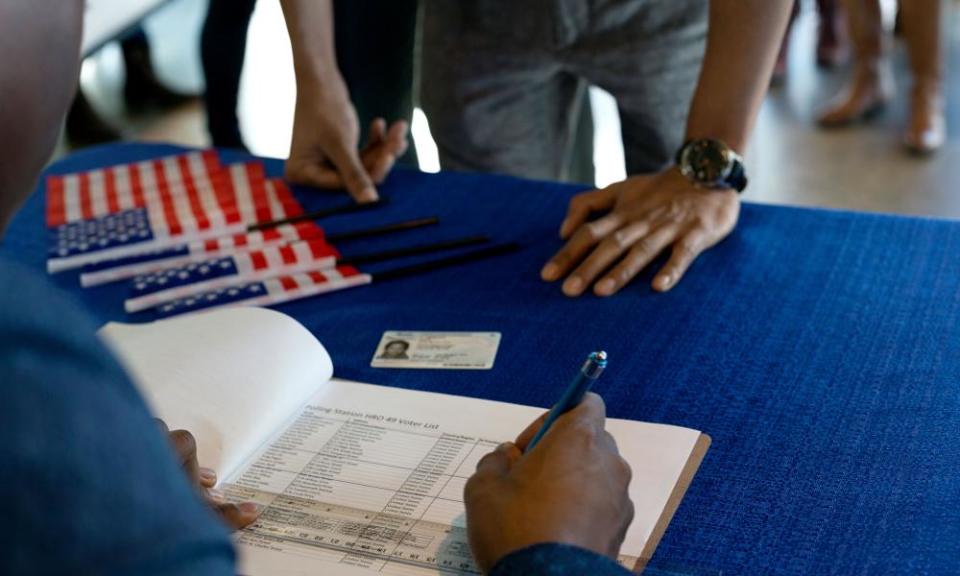For America’s black politicians, winning an election can lead to jail

On 5 November, Hester Jackson-McCray, a black woman, narrowly defeated Republican incumbent Ashley Henley by 14 votes in a heated race for a seat in the Mississippi house of representatives.
Shortly after, Henley asked the Republican-dominated Mississippi house to overturn the election results, based on claims including that one precinct didn’t collect voter signatures (a technicality required to process ballots in the state) and that her campaign had found three uncounted paper ballots. Jackson-McCray, meanwhile, pointed out that the election had been run by the Republicans – Henley’s party – making it unlikely that she had manipulated the race in her favor. This turn of events was particularly surprising because the Republican party tends to cast doubts on the existence of voter suppression, the idea that political parties find ways to prevent Americans from voting, calling it a Democratic myth.
“Elections are elections. It’s not a guaranteed position,” Jackson-McCray said. “She has the right to go through the technicalities, but I think if people read this notice she’s putting out, it looks like she’s arguing that her own party didn’t manage the election right. The election was run by Republicans.”
It’s a challenge that black politicians in America have faced for decades: when the white majority fails to maintain the status quo through a democratic election, there’s still a way to undermine the shift in power. Overturn the election, or prosecute the official for so-called voter fraud.
In Canton, Mississippi, one of the most extreme prosecutions to date was pursued against Courtney Rainey, a community activist who was arrested and convicted of voter fraud in September, even while appointed to the school board.
Ironically, the alleged fraud was not conducted the year of her election, but during a previous cycle when the district attorney accused her of encouraging someone who no longer had voting rights to vote. The voter fraud charge was so frivolous that Rainey was eventually acquitted. But in the process, she was charged with witness intimidation and sentenced to 15 years.
Her case isn’t an anomaly in Mississippi, where several others were indicted for various election crime charges at the same time in Canton. A city alderman’s alleged crime was being aware that a voter was no longer living at the address on the voter registration. He was forced into a plea deal which included five years’ probation and resigning from his seat on the city council. Of the eight people arrested in connection to the Canton voter fraud sweep, three were elected officials, one was the unelected city clerk and one was a former fire chief.
All of the them were black.
In recent years, Georgia has also seen several high-profile prosecutions aimed at elected officials, including Olivia Pearson, the Douglas city commissioner, and 12 people in Quitman county. In the Quitman case, three of the indicted activists were also elected members of the all-black school board that had been recently elected.
Removing a single black elected official has a specific short-term impact. But the longer-term impact can prove even more pernicious: black voters will become even more skeptical about an electoral system that we know was not built for us. Even if targeted to a local-level race, such abuses of power create a ripple effect that ultimately affects every race from president down the entire ballot.
Like many forms of voter suppression, these tactics have their roots in the Reconstruction era. In September 1868, white members of the Georgia legislature voted to remove 28 elected black legislators on the grounds that they had no right to hold public office under the new state constitution.
In Selma, Alabama, almost 90 years before the city would become known for Bloody Sunday, the black incumbent representative Jeremiah Haralson was running for re-election against the white Dallas county sheriff, Charles M Shelley. Haralson was in the middle of a public speech when he was interrupted by an armed deputy, escorted to see the sheriff and forced at gunpoint to promise not to hold any more political meetings.
After losing the election, Haralson filed an official complaint to Congress regarding this incident and other irregularities, and in a letter to the editor [of the Washington Post] he wrote: “Mr Shelley is no more entitled to the seat in the 45th Congress than the sultan of Turkey, and is only here by taking advantage of his own wrong.”
Haralson never received a response from Congress.
The motivations behind today’s efforts to overturn elections and remove black elected officials are not very different than Reconstruction-era motivations. After all, when a group that has benefited from majority rule faces the demographic reality that they will no longer be the majority, it’s inevitable that some members of that group will seek to simply reverse the results.
Back in Mississippi, this means that Hester Jackson-McCray could be forced to continue fighting, and raising money, for an election she already won.
Cliff Albright is the co-founder of Black Voters Matter

 Yahoo News
Yahoo News 